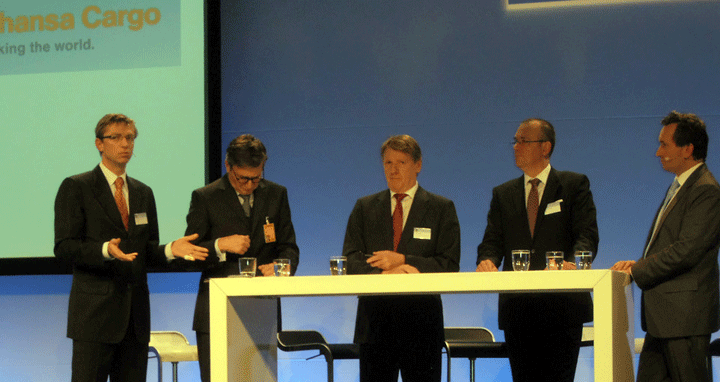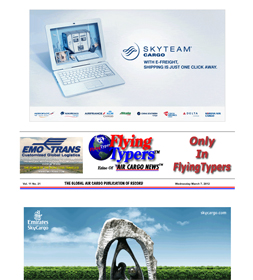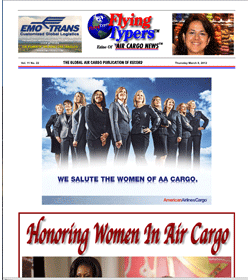 |
 |
|
| |
||
|
Vol. 11 No. 23 Friday March 9, 2012 |
|
There are a lot of conferences going
on right now, some as far away as two days by air, and despite everything
else besetting the air cargo industry today, including the challenges
of a down business year (so far), there is no doubt that these shows
will go on.
|
|
To our knowledge, this effort is unique
amongst all carriers, with Lufthansa Cargo as a major global factor
in driving change and better understanding across the board in cargo
security.
So now after giving credit where it
is due, what else happened?
In a world where timing is often everything,
the event this past Monday played against European Union security
directives, which say March 25, 2013, is the deadline for member states’
shippers to be certified known shippers; air cargo from all other
shippers will require exacting and cost-intensive security inspections
prior to being allowed onboard aircraft.
At Frankfurt on March 5 were some 300
attendees and that number, considering the subject compares, very
well to many other high profile industry events.
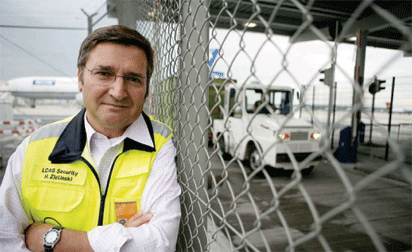 The
agenda was simple and straightforward, divided into alternating presentations
and panels, all deftly managed with a light touch by Harald Zielinski,
Lufthansa Cargo’s Head of Security (left) and Nils Haupt, head
of corporate communications.
The
agenda was simple and straightforward, divided into alternating presentations
and panels, all deftly managed with a light touch by Harald Zielinski,
Lufthansa Cargo’s Head of Security (left) and Nils Haupt, head
of corporate communications.
The gathering was informative, confrontational,
funny and for folks who get hot thinking about security, or ought
to, a hell of a ride in just a few hours.
But the business was dead serious.
The looming deadline for certification
“known shippers” and how a potential avalanche of cargo
from uncertified shippers would impact life at hub Frankfurt during
peak time, between 8 and 9am, at gate 31 and 32, when up to 1,500
trucks pass through the Cargo City, brought home the reality of the
world just outside the conference room windows.
For Frankfurt, Europe’s top air
cargo hub, to meet demand that cargo from unregistered shippers be
screened at the airport will cause nightmarish scenarios with miles
and miles of backed up trucks spilling onto the autobahn, waiting
for their cargo to be processed.
If anything, the conference was also
a reminder of the deep and real cultural differences between Europe
and America, and how perception is reality.
Amongst attendees at this gathering
were a shining cut of mighty Germany’s top supply chain and
logistics representatives—shippers, forwarders, airlines, airports,
ground handlers, truckers, and their respective associations—united
in collective dismay at none other than a German government body imposing
a security regime that they believe is harsher than neighboring countries.
There is genuine concern that once enacted
for Frankfurt, there could follow an erosion of FRA’s number
one European spot as a cargo hub.
As Harald Zielinski sees it, the basis
for these regulations is one and the same European Union mandate.
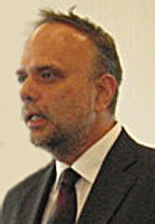 “This same set of rules is interpreted
to mean a full stop in Germany, but turns out to be more of a benign
warning sign in AMS and LUX and the equivalent of ‘bon voyage’
in CDG.”
“This same set of rules is interpreted
to mean a full stop in Germany, but turns out to be more of a benign
warning sign in AMS and LUX and the equivalent of ‘bon voyage’
in CDG.”
One of the speakers, Juergen Knipfer,
(right) supply chain security manager for Siemens, suggested that
since air cargo’s lingua franca was English, regulation ought
to be in English to be consistent, rather than the currently disparate
national versions in various EU countries.
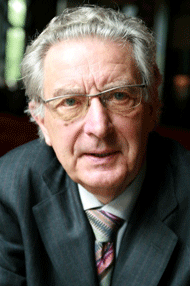 The keynote speaker, Gerhart Baum, (left)
a former minister of the interior, made much of the security and freedom
conundrum.
The keynote speaker, Gerhart Baum, (left)
a former minister of the interior, made much of the security and freedom
conundrum.
Baum noted that Islamic terror was “unknown”
compared to domestic terror in his time serving as interior minister,
but one had to come to terms with it.
He noted his experience in balancing
privacy and human rights with security concerns and voiced his newfound
support of the German supply chain industry for its competitiveness
and reasonable cost of doing business while also maintaining security.
Herr Baum declared that the German equivalent
of the FAA—the LBA (Luftfahrtbundesamt)—would not be able
to complete the certification process in good time.
Mr. Baum suggested that pressure needed
to be kept on elected officials as the current situation calls for
urgent action.
As an experienced politician, Baum said
he had seen too many symbolic measures aimed to calm down public concerns
with insufficient regard to cost and the impact on the supply chain.
Rather tellingly, at this Lufthansa
gathering, no other involved German government representatives from
related ministries showed up, despite invitations, be it the interior
or finance.
The sole LBA delegate was in the unenviable
position of serving as the whipping boy for all those that had a bone
to pick; there were many, and none held back!
Somewhere, one had to grudgingly respect
the fact that the man showed up and tried his best to present the
position of the LBA, firm deadline and all, and inform about efforts
underway to optimize the application process and staff up.
The LBA speaker reiterated that certification
is a dynamic process, so there will be audits even in post-certification,
including a re-certification audit every five years.
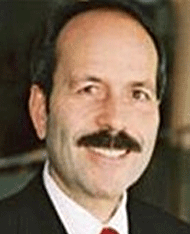 In
his remarks, Dr. Karl-Rudolf Rupprecht, (right) Lufthansa Cargo executive
board member operations, noted that since 9/11, security has caused
a tenfold increase in the cost of air cargo, which is untenable going
forward.
In
his remarks, Dr. Karl-Rudolf Rupprecht, (right) Lufthansa Cargo executive
board member operations, noted that since 9/11, security has caused
a tenfold increase in the cost of air cargo, which is untenable going
forward.
Despite the volume and more stringent
security measures, Lufthansa has handled cargo with a 0.03 percent
error rate.
Rupprecht went on to list the bizarre
situation of not being allowed to deploy screening technology (in
use in the U.S. and elsewhere in Europe) in Germany, which was very
unproductive and an irritant; his hope was that the conference would
advance the discussion to affect a change in this state of affairs.
Herr Ruprecht called for faster implementation
of the certified known shipper approval process.
Dr. Rupprecht said he found it was “neither
comprehensible nor acceptable that U.S. authorities recognize security
measures for air cargo from, say, France or Switzerland, but don’t
recognize the virtually identical measures that apply in Germany.
“The results are additional checks
on all departures from Germany to the USA and an unacceptable competitive
disadvantage for Germany.” He mentioned the new construction
of the Lufthansa Cargo Center in Frankfurt due for completion in 2017-2018
and reinforced the fact that security is not negotiable, calling for
an ongoing dialogue with all stakeholders.
As the week continued in Frankfurt,
global and European harmonization and reciprocal acceptance of security
regimes was hotly and loudly debated, especially directed at a USA
TSA delegation at the event.
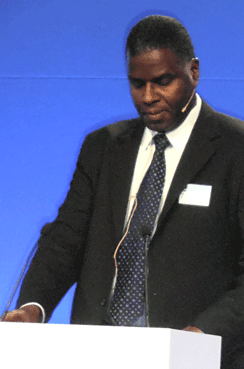 Led
by the jovial Victor Parker, (left) TSA’s Washington-based branch
manager, global cargo programs, the gathering learned first hand of
the U.S. experience with 100 percent piece-level screening taking
place at 1,500 screening facilities.
Led
by the jovial Victor Parker, (left) TSA’s Washington-based branch
manager, global cargo programs, the gathering learned first hand of
the U.S. experience with 100 percent piece-level screening taking
place at 1,500 screening facilities.
Mr. Parker mentioned the remaining challenges,
with inbound air cargo totaling 2.8 billion pounds on passenger aircraft
coming from 94 countries, adding:
“TSA understands the complexity
of the global supply chain and has endeavored to increase security
without impeding the flow of commerce.
“In terms of cargo volume, the
UK, Japan, Germany, France, and the Netherlands, make up 80 percent
of US imports.
“TSA is engaged in working with
the authorities of these and other countries to recognize commensurate
national security programs.
“Mail was included in the program
and evaluation criteria for security comprised of facilities, personnel,
cargo screening, chain of custody standards, employee security training,
and compliance and oversight activities.”
As meetings on common ground can be surprising,
we learned at Frankfurt last week that some security procedures can
amaze.
For example, some American and European
authorities are far more comfortable using canines as an integral
component of a total security-screening regime, differing from their
German counterparts, who disallow their use.
Yet paradoxically, both German police
and Customs use sniffing dogs when inspecting airport air cargo warehouses!
Another unapproved method in Germany,
which is widespread elsewhere, is EDT—explosive sniffing technology.
At the conference, speaker after speaker
appealed to the LBA and the heavens to allow an all-inclusive security
regime and not X-ray exclusively.
Should X-ray remain the only authorized
methodology, projections made by Fraport vice president real estate,
Christoph Hommerich, estimated that about 100,000 square meters of
real estate would be needed to install upward of 200 X-ray machines.
Currently at FRA there are 30 machines
to screen the expected onslaught on cargo from unregistered shippers.
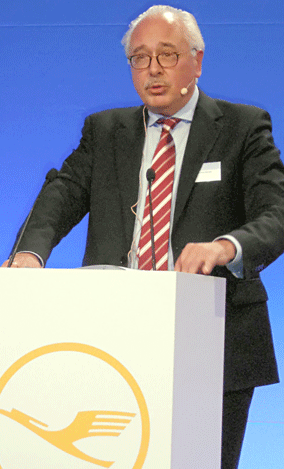 We also learned last week that a cargo
action plan has been developed by major stakeholders forming the Cargo
City Task Force for a Cargo City common IT platform that would include
optimized truck deliveries and communications.
We also learned last week that a cargo
action plan has been developed by major stakeholders forming the Cargo
City Task Force for a Cargo City common IT platform that would include
optimized truck deliveries and communications.
Based on the response of the audience,
in lieu of an applause-o-meter, Professor Elmar Giemulla (standing
at podium) from the Berlin TU (technical university) did a superb
job of broaching a dry and potentially explosive subject in a performance
worthy of any top-notch standup comedian.
The law professor’s witticisms,
sarcasm and acerbic tone danced deftly between mock seriousness and
a slew of legal complexities.
His main point in all of this was that
states regularly transfer to industry responsibilities that are inherently
theirs to decide upon.
Yet the certified known shipper program
edicts exceed the traditional legal framework.
In his talk, he raised the prospect
of government liability when the state fails to act in accordance
with its responsibilities.
The good professor addressed the role
and impact of the European Administrative Court, which may be called
upon to rule vis-à-vis national laws, something he believes
could be invoked in this instance.
“While passing a law, the state
was unable to manage and process certified known shipper applications
in a timely manner, which stands to directly impact meeting the set
deadline,” he said.
So now the clock is ticking to March
25, 2013, when the certified known shipper program goes into effect,
and the consensus here is that no one was entirely sure, but the estimated
number of shippers ranged anywhere from 40,000 to 60,000 entities
to be registered.
Given that less than 5,000 applications
have been received by the LBA, it was easy to understand the palpable
frustration and rising anxiety nearing on open hostility to this seemingly
immovable looming deadline staring everyone in the face.
Summing up this Fifth Lufthansa Security
Conference, some optimism was expressed concerning the certification
by large shippers, which could in fact represent up to 80 percent
of the total tonnage.
But coordination and integration across
the industry are required and encouraged in order to best cope with
the total capacity and processes challenges.
Ted Braun
|
Having just concluded
at the Lufthansa Cargo Security Conference 2012 that optimizing
massively parallel silos is passé in logistics, and that
the collective rather than the individual good must prevail if,
despite all odds, hub FRA is to survive and thrive in the years
to come for all, the media was welcomed to the signing ceremony
for the Cargo City Community initiative!
|
Get
On Board Air Cargo News FlyingTypers |
If
You Missed Any Of The Previous 3 Issues Of FlyingTypers |
|||||
|
|||||
FT030312 |
FT030812 |
||||
|---|---|---|---|---|---|


